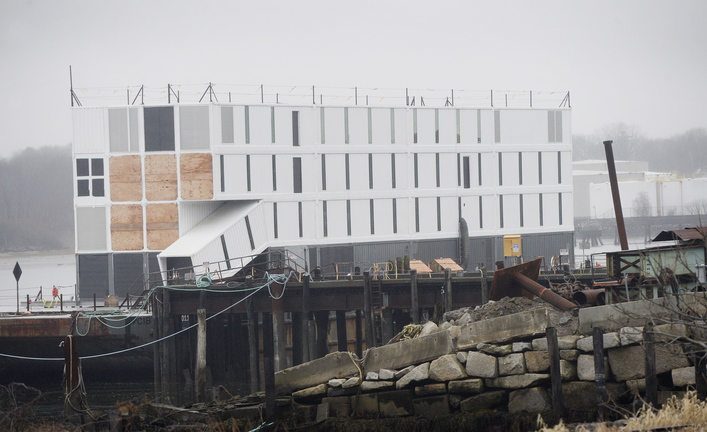The four-story structure on Google’s barge in Portland Harbor will be one of three floating stores that the high-tech company plans to launch, according to documents obtained by a San Francisco newspaper.
The so-called Google barges are expected to be moored at docks in San Francisco, New York City and Los Angeles in a project that will cost $35 million, according to internal budget documents for Turner Construction Co., which is working on the barge in San Francisco.
Each barge will support a floating store for launching Google Glass, a wearable computer built into glasses-like frames that is now in development, according to the San Francisco Chronicle.
In an email to the Portland Press Herald on Monday, Google remained coy about the barges’ purpose, saying the company’s current plan is to use each one as an “interactive space where people can learn about new technology.”
The structure in Portland Harbor was assembled in New London, Conn., and hauled by tugboat into Portland Harbor on Oct. 10. It’s moored at the Rickers Wharf Marine Facility, where Cianbro Corp. is scheduled to do a significant amount of interior work on it. To date, very little, if any, work has been done.
The barges in Portland and San Francisco are owned by a company affiliated with Google, called By and Large. The structures are made from recycled shipping containers bolted together – four containers long, four containers high and four containers wide.
Initial speculation about the purpose of the barges focused largely on Google’s patented plan to build floating data centers, which would use ocean water to cool massive computer servers that store and process data.
The idea that Google was building floating stores emerged a month ago, after a report by a San Francisco television station, citing multiple anonymous sources. KPIX-TV reported that the structures have interchangeable parts so they can easily be put together and taken down, and they will serve as showrooms to promote the launch of Google Glass next year.
Each barge would have an invitation-only party deck for upscale customers, the station reported.
In Maine, the idea of a floating showroom was viewed by some as a brilliant marketing ploy and real estate move.
Curtis Picard, executive director of the Retail Association of Maine, noted that a new trend in retail is the “pop-up store,” in which a retailer operates a store for a short time in a trendy shopping district. Pop-up stores let retailers try out new locations at relatively modest cost and risk.
Floating showrooms would also attract media attention and public interest. “If it’s not true, what a great idea,” Picard said at the time.
Google’s desire to describe the floating structures as “interactive spaces” or “temporary technology exhibit space” rather than “stores” may be a legal strategy aimed at skirting San Francisco zoning rules that prohibit floating stores, said Daniel Eran Dilger, a writer for AppleInsider, a website that reports news and rumors about Apple products.
Mooring a barge off San Francisco would require a permit from the Bay Conservation and Development Commission, and Google would have to present a plan involving maritime or recreational use, Dilger wrote.
The plans that By and Large presented to the Port of San Francisco indicate the stacked containers would be outfitted with decorative sails so the barge would look like a boat. According to the document from Turner Construction, the sails would cost about $350,000.
“That might not be enough to sneak a huge Google Glass retail store through the permitting process,” Dilger wrote.
No one is talking about Google opening shop in Portland Harbor. It would be an “intriguing” opportunity for the city to market itself if Google did, said Greg Mitchell, the city’s economic development director.
Considering the competing interests on the city’s waterfront, however, permitting such an operation would be challenging, he said.
Tom Bell can be contacted at 791-6369 or at:
tbell@pressherald.com
Twitter: @TomBellPortland
Send questions/comments to the editors.


